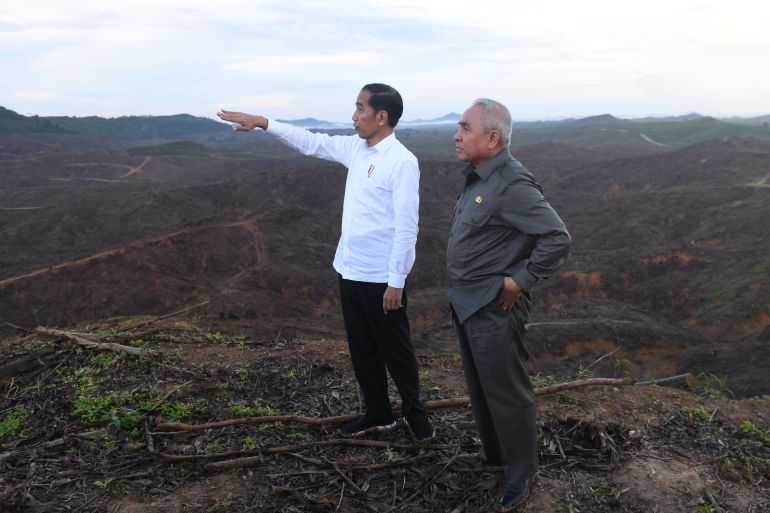Indonesia names new capital Nusantara as MPs back relocation
The ambitious $32.5bn project will move Indonesia’s capital from the overcrowded, polluted and sinking Jakarta to a sparsely populated jungled area on Borneo.

Indonesia’s parliament has passed a bill to relocate the nation’s capital from Jakarta to a jungled area on Borneo island.
The new state capital law, approved on Tuesday, provides a legal framework for President Joko Widodo’s ambitious $32.5bn megaproject and stipulates how its development will be funded and governed.
Keep reading
list of 4 itemsPhilippines urges Indonesia to lift coal export ban
Indonesia to ratify RCEP in 2022: Economic minister
Rohingya refugees brought ashore after dramatic Indonesia rescue
The president chose the new city’s name – Nusantara, a Javanese name for the Indonesian archipelago.
“The new capital has a central function and is a symbol of the identity of the nation, as well as a new centre of economic gravity,” Planning Minister Suharso Monoarfa told parliament following the bill’s passage.
‘Super hub’
Plans to relocate the government from Jakarta – a bustling metropolis of 10 million people that suffers from chronic congestion, floods, pollution, and is sinking because of over-extraction of groundwater – have been floated by multiple presidents, but none have made it this far.
Jokowi, as the president is widely known, first announced the plan in 2019, but progress was delayed by the COVID-19 pandemic.
His government envisions the new capital as a low-carbon “super hub” that will support the pharmaceutical, health and technology sectors and promote sustainable growth beyond Java Island, the country’s most densely populated area.
Currently, 54 percent of Indonesia’s nearly 270 million people live on Java.
The site of the new capital, some 2,000km (1,250 miles) northeast of Jakarta, will straddle the regencies of North Penjam Paser and Kutai Kartanegara in Kalimantan Province on Borneo, which are home to 900,000 people. It is situated in the centre of Indonesia, in one of the areas least prone to the natural disasters that regularly hit the vast archipelago of 17,000 islands.
The government has set aside 180,000 hectares (445,000 acres) of land for the planned city, and Jokowi has previously said moving the administrative centre would take up to a decade. The state will fund 19 percent of the $32.5bn cost, with the rest coming from public-private partnerships and private investment.
The price tag includes new government offices and homes for about 1.5 million civil servants.
But critics say there has been limited public consultation on the plan, while environmentalists fear the move will hasten the destruction of forests that are home to orangutans, sun bears and long-nosed monkeys, as well as increasing pollution already on the rise from coal mining and palm oil industries.
Nusantara – which follows the creation of new capitals in countries such as Brazil and, more recently, Myanmar – will be led by a chief authority whose position is equivalent to a minister, according to Saan Mustofa, deputy chair of the bill’s special committee.
Among those reportedly being considered for the position are former research and technology minister, Bambang Brodjonegoro, and Jakarta’s former governor, Basuki Tjahaja Purnama, better known as Ahok.